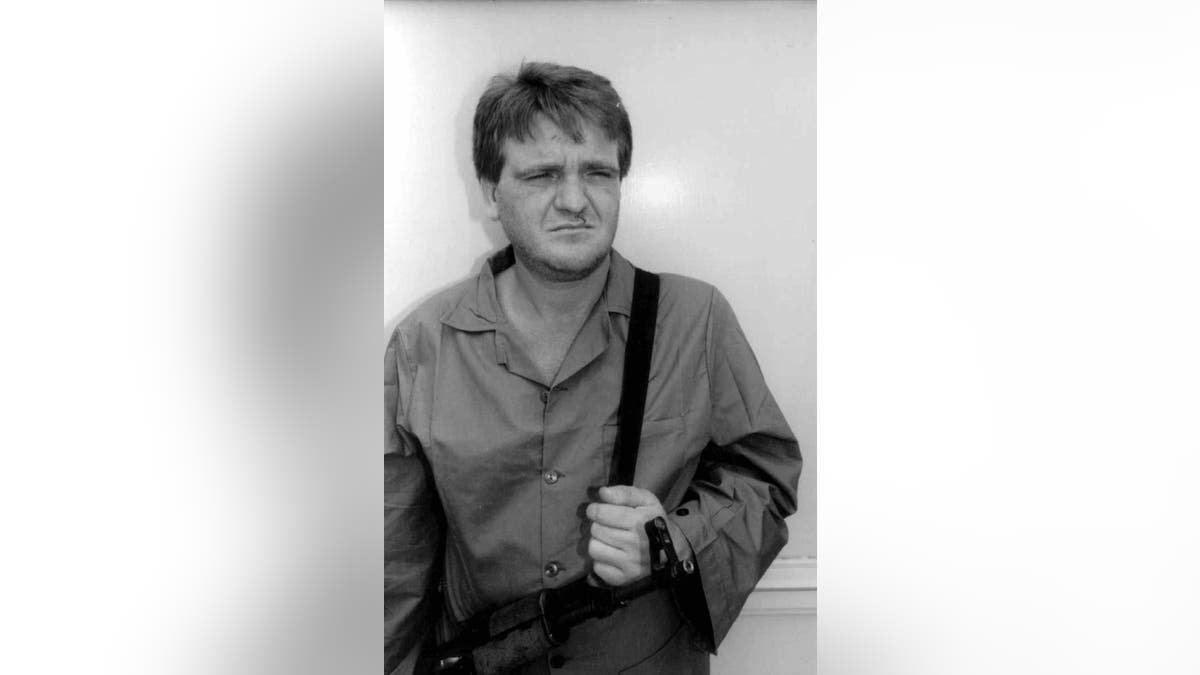
FILE - In this June 1995, file photo, convicted drug lord Hector "El Guero" Palma is presented to the press holding an assualt rifle following his June 25, 1997 arrest in the city of Guadalajara, state of Jalisco, Mexico. (Jorge Zamora/Siglo 21 via AP, File)
MEXICO CITY – Drug lord Hector "El Guero" Palma, one of the founders of the Sinaloa Cartel, returned to his native Mexico after serving almost a decade in a U.S. prison and was immediately transported to another maximum-security lockup where he will await trial for two murders.
U.S. authorities handed over Palma in Matamoros, across the border from Brownsville, Texas, according to a statement from the Mexican Attorney General's Office. Palma had been released from federal prison in California on Friday and put into the custody of U.S. immigration officials.
The drug lord was flown to Mexico City late Wednesday and then transported to the Altiplano prison outside the capital, the same prison that Sinaloa Cartel leader Joaquin "El Chapo" Guzman escaped from in 2015.
Palma was detained under an arrest order from the western state of Nayarit. No additional details were provided about the two murders.
Earlier, Mexican officials had said they did not know whether authorities in Mexico planned to bring new charges against Palma. If not, Palma would go free.
Attorney General Arely Gomez had said her office was reviewing whether there were any pending cases against Palma. "We are in the process of carrying out an exhaustive review, checking all the prosecutors' offices."
Palma was arrested in June 1995 in western Mexico and later extradited to the U.S. where he pleaded guilty to cocaine trafficking charges and was sentenced to 16 years in prison. The U.S. Embassy said Palma received early release for good behavior.
Some experts believed that Palma could have returned to drug trafficking if allowed to walk free, but would have faced a world that has changed since he helped Guzman found the Sinaloa cartel in the early 1990s.
"He could try to get involved, but I don't know how directly," said Mexico City-based security analyst Alejandro Hope. Palma may have lost much of his money and his connections since he was arrested following a plane crash.
Once released, he could have just disappeared into Mexico's hinterlands, "just like Caro Quintero," Hope noted, referring to the last major old-guard drug lord released, Rafael Caro Quintero.
Freed by apparent judicial misconduct in 2014, and currently sought on a re-arrest warrant, Caro Quintero hasn't been seen since. Given that he participated in the 1985 torture-slaying of U.S. DEA agent Enrique "Kiki" Camarena, Caro Quintero's release was a major embarrassment for the Mexican government.
Palma's return threatens to be another headache.
Even before he was extradited to the United States in 2007, Palma had compiled an excellent track record of beating charges in Mexico. He was acquitted, or had the charges dismissed, for accusations including multiple counts of murder, kidnapping, robbery and drug possession.
In Mexico, Palma, known as "El Guero" for his fair hair, served only a 2 1/2-year sentence for minor convictions including weapons violations.
Like his business associate, "El Chapo," Mexico appears unable to do a very good job of keeping Palma in jail. He essentially fell into the hands of law enforcement in 1995 after his plane crashed.
And with all the trouble that Mexico is currently going to to get "El Chapo" Guzman extradited, Palma's return raises the unnerving possibility that some day, Guzman could be sent back.
"If we extradite narcos to the United States, we should demand they not send them back," read a cartoon in the newspaper La Jornada, depicting Palma's return.
That's not just an idle jibe, says Mike Vigil, a former head of international operations for the U.S. Drug Enforcement Administration.
"There are a lot of individuals in Mexico, government officials, that are a little bit perplexed because they feel that if the United States wanted Palma, that he should have remained in prison here for a lot longer time ... And then you're letting him go very quickly," Vigil said.
"That is their concern, so that is going to throw a little bit of a bar into the extradition process between Mexico and the United States, which has been sporadic at best since the inception since the extradition treaty was signed between the two nations in 1978."
Vigil says Palma is likely to cause trouble if he's released. "In my opinion based on 13 years in Mexico ... Palma's release will translate to more drugs in the U.S. and more violence for Mexico."
"The thing, the only business that 'El Guero' Palma understands is the drug trade, he's an expert when it comes to trafficking and distributing drugs," Vigil said.
And as Vigil notes, Palma "is extremely, extremely, extraordinarily vicious."
He became vicious after his wife was seduced by a rival trafficker, who had her withdraw a purported $7 million from Palma's bank accounts, then beheaded her and sent her severed head to Palma. Venezuelan trafficker Rafael Clavel then allegedly took Palma's two children, aged four and five, and threw them off a bridge.








































